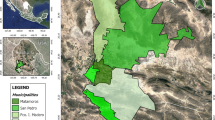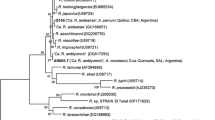Abstract:
Tick-borne spotted fever in Brazil is known to be caused by two agents, Rickettsia rickettsii and Rickettsia parkeri. Nothing was known about these agents in one area of the Atlantic rainforest biome of Bahia state, where during March to June 2016, 356 rural dogs and 69 horses were sampled and their sera were processed through indirect immunofluorescence assay against antigens of R. rickettsii, R. parkeri, Rickettsia amblyommatis and Rickettsia bellii. Ticks collected from these dogs and horses were molecularly tested for the presence of rickettsial DNA. Overall, 16.4% (58/356) dogs and 24.6% (17/69) horses were seroreactive to Rickettsia spp. Five tick species, Rhipicephalus sanguineus sensu lato (s.l.), Amblyomma ovale, A. sculptum, R. microplus, and A. naponense, were collected from dogs, whereas horses were infested by A. sculptum and Dermacentor nitens. A total of 242 ticks from dogs and 62 from horses were analyzed by PCR targeting rickettsiae, which were detected in only 4/27 (14.8%) A. ovale. Fragments of the rickettsial gltA and ompA genes from these four ticks were 100% identical to the Atlantic rainforest strain of R. parkeri. The presence of A. ovale on dogs was positively associated with local canine seroreactivity to R. parkeri. Our results provide evidence for the transmission of R. parkeri strain Atlantic rainforest from A. ovale to domestic dogs within the rural area of Ilhéus, similarly to other areas of the Atlantic rainforest biome of Brazil, where human cases of R. parkeri-caused spotted fever have been reported.

Similar content being viewed by others
References
Barbieri ARM, Filho JM, Nieri-bastos FA et al (2014) Epidemiology of Rickettsia sp. strain Atlantic rainforest in a spotted fever-endemic area of southern Brazil. Ticks Tick-Borne Dis 5:848–853. https://doi.org/10.1016/j.ttbdis.2014.07.010
Barros-Battesti DM, Arzua M, Bechara GH (2006) Carrapatos de Importância Medico-Veterinária da Região Neotropical: um Guia Ilustrado para Identificação de Espécies. Vox/ICTTD-3/Butantan, São Paulo, p 223
Bermúdez CSE, Zaldívar AY, Spolidorio MG et al (2011) Rickettsial infection in domestic mammals and their ectoparasites in El Valle de Antón. Coclé, Panamá Vet Parasitol 177:134–138. https://doi.org/10.1016/j.vetpar.2010.11.020
Clifford CM, Anastos G (1960) The use of Chaetotaxy in the identification of larval iicks (Acarina: Ixodidae). J Parasitol 46:567–578. https://doi.org/10.2307/3274939
Costa P, Moraes-filho J, Martins TF et al (2017) Rickettsia amblyommatis infecting ticks and exposure of domestic dogs to Rickettsia spp. in an Amazon-Cerrado transition region of northeastern Brazil. PLoS ONE 12:1–17. https://doi.org/10.1371/journal.pone.0179163
Faccini-Martínez AA, Oliveira SV, Cerutti C Jr, Labruna MB (2018) Rickettsia parkeri spotted fever in Brazil: epidemiological surveillance diagnosis and treatment. J Health Biol Sci 6:299–312. https://doi.org/10.12662/2317-3076jhbs.v6i3.1940.p299-312.2018
Krawczak FS, Muñoz-leal S, Guztazaky AC et al (2016a) Case report: Rickettsia sp. strain Atlantic Rainforest infection in a patient from a spotted fever-endemic area in Southern Brazil. Am Soc Trop Med Hyg. https://doi.org/10.4269/ajtmh.16-0192
Krawczak FS, Agostinho WC, Polo G et al (2016b) Comparative evaluation of Amblyomma ovale ticks infected and noninfected by Rickettsia sp. strain Atlantic rainforest, the agent of an emerging rickettsiosis in Brazil. Ticks Tick-borne Dis 7:502–507. https://doi.org/10.1016/j.ttbdis.2016.02.007
Krawczak FS, Labruna MB, Hecht JA et al (2018) Genotypic characterization of Rickettsia bellii reveals distinct lineages in the United States and South America. Biomed Res Int. https://doi.org/10.1155/2018/8505483
Labruna MB, Whitworth T, Horta MC et al (2004) Rickettsia species infecting Amblyomma cooperi Ticks from an area in the state of São Paulo, Brazil, where Brazilian spotted fever is endemic. J Clin Microbiol 42:90–98. https://doi.org/10.1128/JCM.42.1.90-98.2004
Labruna MB, Horta MC, Aguiar DM et al (2007) Prevalence of Rickettsia infection in Dogs from the urban and rural areas of Monte Negro Municipality, Western Amazon, Brazil. Vector-Borne Zoonotic Dis 7:249–255. https://doi.org/10.1089/vbz.2006.0621
Labruna MB et al (2011) Rickettsioses in Latin America, Caribbean, Spain and Portugal. RevMVZ Córdoba 16:2435–2457
Martins TF, Onofrio VC, Barros-battesti DM, Labruna MB (2010) Diseases Nymphs of the genus Amblyomma (Acari: Ixodidae) of Brazil: descriptions, redescriptions, and identification key. Ticks Tick-Borne Dis 1:75–99. https://doi.org/10.1016/j.ttbdis.2010.03.002
Martins TF, Barbieri ARM, Costa FB et al (2016) Geographical distribution of Amblyomma cajennense (sensu lato) ticks ( Parasitiformes: Ixodidae ) in Brazil, with description of the nymph of A. cajennense (sensu stricto). Parasites Vectors 9:186–199. https://doi.org/10.1186/s13071-016-1460-2
Murray GGR, Weinert LA, Rhule EL, Whelch JJ (2016) The phylogeny of Rickettsia using different evolutionary signatures: how tree-Like is bacterial evolution? Syst Biol 65:265–279. https://doi.org/10.1093/sysbio/syv084
Nieri-bastos FA, Horta C, Barros-battesti DM et al (2016) Short communication isolation of the pathogen Rickettsia sp. strain Atlantic rainforest from its presumed Tick vector, Amblyomma ovale (Acari: Ixodidae), from two areas of Brazil. J Med Entomol. https://doi.org/10.1093/jme/tjw062
Nieri-bastos FA, Marcili A, De Sousa R et al (2018) Phylogenetic evidence for the existence of multiple strains of Rickettsia parkeri in the New World. Appl Environ Microbiol 84:e02872–e02817.https://doi.org/10.1128/AEM02872-17
Parola P, Paddock CD, Socolovschi C et al (2013) Update on Tick-Borne Rickettsioses around the world: a geographic approach. Clin Microbiol Rev 26:657–702.https://doi.org/10.1128/CMR.00032-13
Pinter A, Labruna MB (2006) Isolation of Rickettsia rickettsii and Rickettsia bellii in cell culture from the Tick Amblyomma aureolatum in Brazil. Ann NY Acad Sci 1078:523–530. https://doi.org/10.1196/annals.1374.103
Piranda EM, Faccini JLH, Pinter A et al (2008) Experimental infection of dogs with a Brazilian strain of Rickettsia rickettsii: clinical and laboratory findings. Mem Inst Oswaldo Cruz 103:696–701. https://doi.org/10.1590/S0074-02762008000700012
Plank SJ, Teixeira RS, Milanesi ML (1979) Febre maculosa em Salvador: descrição de um caso. Rev méd Bahia 25:330–334
Regnery RL, Spruill CL, Plikaytis BD (1991) Genotypic Identification of Rickettsiae and estimation of intraspecies sequence divergence for portions of two Rickettsial genes. J Bacteriol 173:1576–1589
Saito TB, Cunha-filho NA, Pacheco RC et al (2008) Canine infection by Rickettsiae and Ehrlichiae in Southern Brazil. Am Soc Trop Med Hyg 79:102–108
Sangioni LA, Soares RM, Galvão MAM et al (2005) Rickettsial infection in animals and Brazilian spotted fever endemicity. Emerg Infect Dis 11:265–270
Silva N, Eremeeva ME, Rozental T et al (2011) Eschar-associated spotted fever Rickettsiosis, Bahia, Brazil. Emerg Infect Dis 17:275–278. https://doi.org/10.3201/eid1702.100859
Silveira I, Pacheco RC, Labruna MB (2007) Rickettsia parkeri in Brazil. Emerg Infect Dis 13:1111–1113
Spolidorio MG, Labruna MB, Mantovani E et al (2010) Novel spotted fever group Rickettsiosis, Brazil. Emerg Infect Dis 16:521–523. https://doi.org/10.3201/eid1603.091338
Szabó J, Pinter A, Labruna MB (2013a) Ecology, biology and distribution of spotted-fever tick vectors in Brazil. Front Cell Infect Microbiol 3:1–9. https://doi.org/10.3389/fcimb.2013.00027
Szabó MPJ, Spolidorio MG, Martins TF (2013b) In vitro isolation from Amblyomma ovale (Acari: Ixodidae) and ecological aspects of the Atlantic rainforest Rickettsia, the causative agent of a novel spotted fever rickettsiosis in Brazil. Parasitology 140:719–728. https://doi.org/10.1017/S0031182012002065
Ueno H, Evelyn T, Costa FB et al (2016) Experimental infection of horses with Rickettsia rickettsii. Parasites Vectors 9:499. https://doi.org/10.1186/s13071-016-1784-y
Acknowledgements
We are grateful to the staff of the Universidade Estadual de Santa Cruz for their help in samples collecting.
Funding
This work was supported in part by the Coordenação de Aperfeiçoamento de Pessoal de Nível Superior - Brasil (CAPES) - Finance Code 001, Fundação de Amparo a Pesquisa do Estado da Bahia (FAPESB) (Grant PNE0001/2014), and Conselho Nacional de Desenvolvimento Científico e Tecnológico (CNPq) (Grant 306308/2015-0).
Author information
Authors and Affiliations
Corresponding author
Ethics declarations
Conflict of interest
The authors declare that they have no conflict of interests.
Ethical approval
All procedures performed in studies involving animals were in accordance with the ethical standards of the institution or practice at which the studies were conducted (CEUA/UESC protocol nº 038/2015).
Additional information
Publisher's Note
Springer Nature remains neutral with regard to jurisdictional claims in published maps and institutional affiliations.
Rights and permissions
About this article
Cite this article
de Oliveira, P.B., Harvey, T.V., Fehlberg, H.F. et al. Serologic and molecular survey of Rickettsia spp. in dogs, horses and ticks from the Atlantic rainforest of the state of Bahia, Brazil. Exp Appl Acarol 78, 431–442 (2019). https://doi.org/10.1007/s10493-019-00397-x
Received:
Accepted:
Published:
Issue Date:
DOI: https://doi.org/10.1007/s10493-019-00397-x




